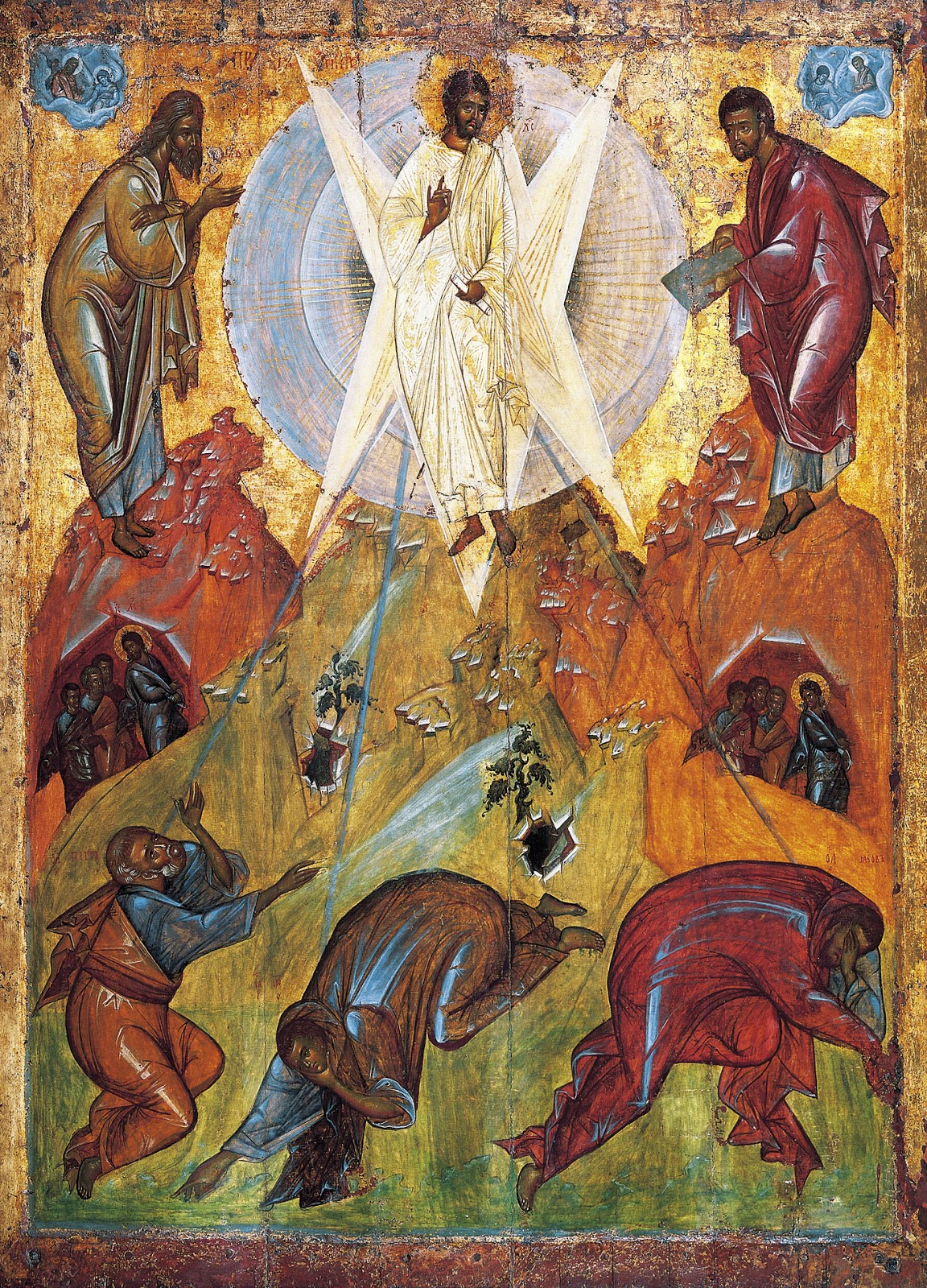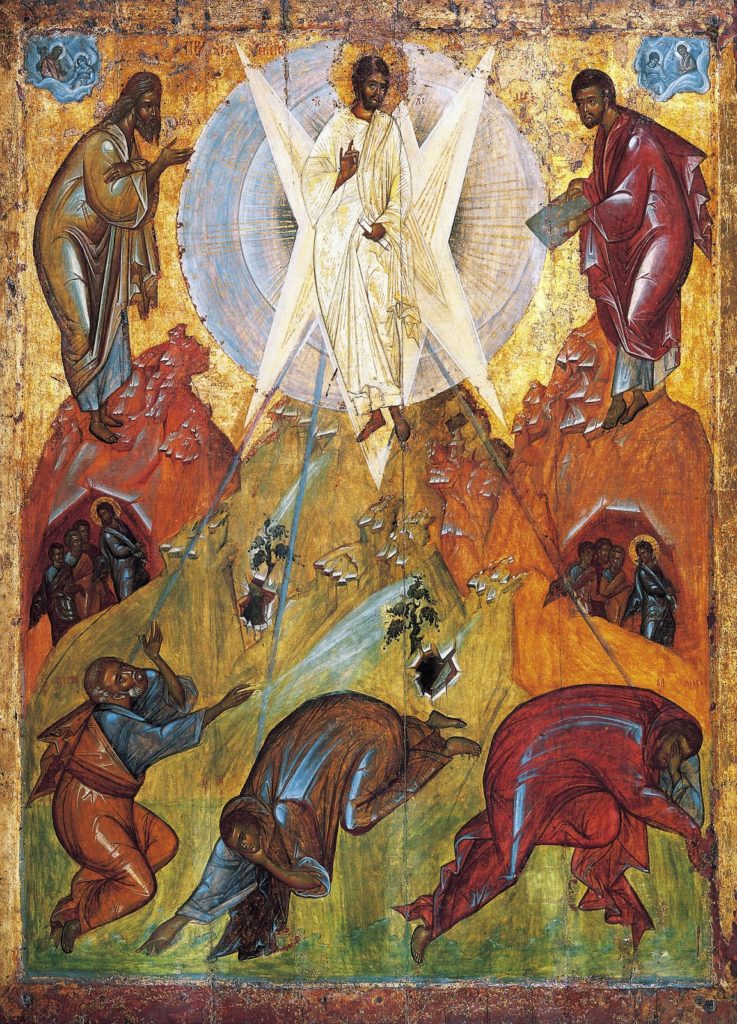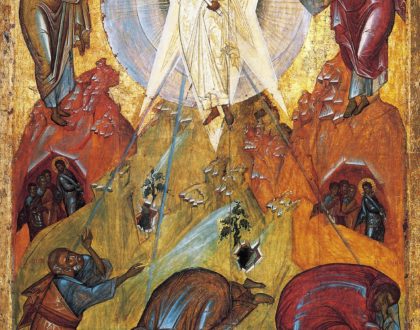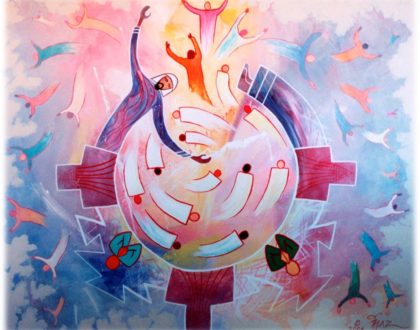May 13 // Psalm 48

by Julie Hordyk
We changed up Sunday worship last week, as I’m sure you know. I’ll tell you, as one who has been singing a lot of songs alone over the past two months, it was really good to worship with even just a few others in the room — and I hope that translated through your computer screens.
As we discussed changing the format of Sunday worship, there were several other components to our weekly liturgies that we wanted to maintain in some way: specifically, the mid-week psalm devotional, the visual art, and the blog. This week we’re trying to combine those things, as you must already know if you’re here.
These devotionals have all been based on psalms so far, but I’ve come across those psalms in varying ways. Sometimes they’ve been borrowed from Sunday’s lectionary, other times from the Daily Office in the Book of Common Prayer, which sets out daily scripture readings for every day of the year — often I’ll take the morning psalm from that Wednesday. And sometimes I’ve just gone with the psalm that I can’t get out of my head… which is what’s happening today.
Over the weekend I wrote a setting of Psalm 48 that I want to share with you, because that is the scripture that is most alive in my spirit today.
Let’s start there. Hear the Word of the Lord:
The Glory and Strength of ZionA Song. A Psalm of the Korahites.
Great is the Lord and greatly to be praised
in the city of our God!
His holy mountain, beautiful in elevation,
is the joy of all the earth,
Mount Zion, in the far north,
the city of the great King.
Within her citadels God
has made himself known as a fortress.
For behold, the kings assembled;
they came on together.
As soon as they saw it, they were astounded;
they were in panic; they took to flight.
Trembling took hold of them there,
anguish as of a woman in labor.
By the east wind you shattered
the ships of Tarshish.
As we have heard, so have we seen
in the city of the Lord of hosts,
in the city of our God,
which God will establish forever. Selah
We have thought on your steadfast love, O God,
in the midst of your temple.
As your name, O God,
so your praise reaches to the ends of the earth.
Your right hand is filled with righteousness.
Let Mount Zion be glad!
Let the daughters of Judah rejoice
because of your judgments!
Walk about Zion, go around her,
number her towers,
consider well her ramparts,
go through her citadels,
that you may tell the next generation
that this is God,
our God forever and ever.
He will guide us forever.
The Lord of Zion
Psalm 48 is about the City of God. In the Jewish imagination, the city of Jerusalem was the center of the world, and the center of Jerusalem was the temple: that physical place was God’s residence, the eternal tabernacle. And the psalm itself is rooted in that place: you can hear the psalmist almost acting as a tour guide, inviting the listener to walk around and see the testimony that this place tells. This part of the city wall is where God saved us from attack. This part of the temple courtyard is where God receives the sacrifices we offer up.
“Walk about Zion, go all around it, count its towers, consider well its ramparts; go through its citadels, that you may tell the next generation that this is God, our God forever and ever.” This must have been a triumphant song, and a poignant one while the temple stood. And after the temple fell — an incredibly painful one, I would think. Seeing the house of God ripped apart, the gold hauled off and melted down… the defeat and the disillusionment of that. That is the kind of pain that shapes generations. I think that’s actually what makes the psalm so compelling to me today, though. Because now, and for a time to come, we are living our own diaspora. Yet we are not without hope, because our hope is not founded in any physical place, but in the Risen Christ, who comes to us no matter where we are.
On Sunday we saw him coming to Stephen the Martyr as he was being killed. As Stephen’s body was being torn down, the King drew near to him and said, Come with me! I will protect you! My love and my power will never fail.
Stephen’s vision of the transfigured Christ is helpful for another reason. The “Zion” that we hope for is not the one that the Psalmist imagined, with the original temple and no plumbing and hardly enough room for the people alive then, let alone the crowd of saints that would need to fit inside now! The coming Kingdom that we hope for will come into being here, on earth, but it will be made new, and it will be different: shimmering and new, verdant, the River of Life flowing through it. The wonder of Zion of yesteryear is only a shadow compared to the glory that will be revealed, one day.
Yet we need this psalm, along with the knowledge of Jerusalem’s former glory and what it meant to God’s covenant people, in order to understand the meaning of this new Kingdom. We need to move toward those things, not away from them, to form our hope as Christians. As we learned in Narnia, “Further up! Further in!” Moving toward Zion and its host of testimonies shows us the faithful God who led a people to that rock, and showed them where to build a temple, and promised them salvation — and then delivered it in the person of Jesus Christ.

Recommended Posts

“The Prayers of the Saints” Sermon Series
September 17, 2020

The Lord’s Prayer Curriculum | Personal or Small Group Study
September 17, 2020
July 15 // Psalm 139
July 16, 2020
